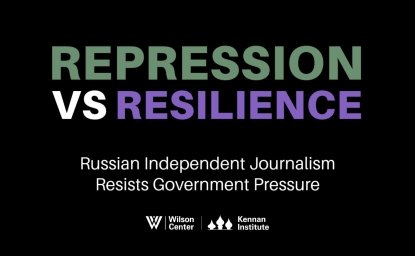Galina Arapova is the Director and a Senior Media Lawyer at the Mass Media Defense Center in Voronezh, Russia.
Read the interview in Russian HERE.
Q: What has been done and what can be done to better educate professional journalists and bloggers, as well as all citizens involved in the work of NGOs or civic initiatives, who might be affected by the latest restrictive Russian legislation, which creates the risk of being declared a foreign agent?
A: The foreign agent legislation affects many people: human rights advocates and activists who work in NGOs that have been labeled foreign agents, journalists who are full-time employees of or who do freelance work for the foreign media, students and young academics who participate in exchange programs with international universities. Any specialist who has received an honorarium for his or her work or a research scholarship and who posts something, anything at all, on social media is already a potential foreign agent. Not everyone fully understands yet how comprehensive the risk of becoming a foreign agent is, even though the media have been providing sufficiently active coverage of this problem. Many seem to think this legislation is not about them, it is about someone else, and so there is no need for them to waste time reading publications about some foreign agents. This is less interesting than a spy novel, after all!
There have already been clarifying webinars and individual consultations for audiences that are interested in the topic and are steeling themselves for possible new life complications (these are mostly journalists, human rights advocates, and activists), and recommendations have been drafted and published. In 2019–2020, the Mass Media Defense Center held a dozen webinars for investigative journalists and for Russian journalists collaborating with international media. Our lawyers also provided individual consultations to journalists who had questions about the foreign agent status in the context of their personal circumstances. And this is going on nonstop. Any forms of clarifications are useful here, because they provide a better understanding of this particular legal risk and suggest an algorithm for what to do if the Ministry of Justice turns its gaze on you specifically.
What else can be done? I believe that support should be complex. I am not talking about legal aid only. It is necessary, but support is not limited to that.
Hundreds of people, including us, are living in constant stress and in anticipation of a “love letter” from the Ministry of Justice. Living in stress is hard, and living while waiting for unfair persecution is even harder. That is why support at various levels is extremely important—legal, tax-related, financial, and psychological. People need to understand that they are not alone, that they are in the company of other decent and respectable people, and that intentional stigmatization through being branded a foreign agent does not irrevocably damage their reputation and life.
This is critically important for people to be able to carry on with their work and not break down, despite the gravity of the situation. According to my observations, there is practically no psychological support. NGO staff are already experiencing burnout, which only gets worse in the oppressive atmosphere created by the government initiatives targeting “foreign agents.” Introducing the foreign agent status for physical persons, establishing criminal liability, and including five individuals on the register of foreign agent media—all this increases the stress levels for the entire and very diverse risk group. And I don’t even know which type of support is more important under these circumstances—legal, financial, or psychological.
From the legal standpoint, we have accumulated practical experience from working with foreign agent NGOs, so lawyers more or less know what to do, and the appeals strategy is clear, all the way up to the European Court [of Human Rights]. But the register of physical persons declared foreign agents may start expanding at a rather high pace, and then considerable funds will be needed to cover the lawyers’ work and to train the newly declared “agents” on how to draft the Ministry of Justice reports. There will also be a need for consultations with tax and finance specialists, and a lot of psychological assistance too.
Taking into account the adopted amendments to the Law on Non-Profit Organizations, according to which foreign agent NGOs will soon be unable to hold any events, including seminars and webinars, without approval from the Ministry of Justice (and without running the risk of getting shut down for procedural error in applying for that approval), it is high time to look for new forms of outreach and interaction with the risk group so that they are not left alone with the problem at a critical moment.
Q: Can and should socially active citizens and professionals be educated in how to protect themselves against an assignation of foreign agent status and about their rights when that status is assigned?
A: Self-defense against the foreign agent status is very tricky. One should either stop being active and voicing one’s views, stop being a human rights advocate or a journalist, and avoid receiving any funds from abroad whatsoever or else study everything that has to do with the foreign agent status and simply brace oneself for that happening sooner or later. This is a personal choice. I am afraid that self-defense in this case essentially means to stop doing what you are doing and find a job in the public sector or in business. And it ought to be a business with no international investment or international partners.
It probably makes sense to explain what a “foreign agent” is and what awaits you if you become one. And it makes sense to prepare step-by-step algorithms for how to live with this status—a sort of service pack that a person can use when necessary to ease the bureaucratic burden and reduce the risk of being penalized under administrative law (or worse, criminal law). One should spell out all the rights that a person has when they become a foreign agent. I think that some of the steps related to disputing the status and complying with the status requirements can be turned into algorithms, so that a newly labeled foreign agent could use them as a cheat sheet to deal with the problem on their own, without relying on professionals (lawyers, accountants, and so on).
Q: What has been done or can be done to better educate and equip lawyers to tackle these new tasks?
A: Some lawyers already have experience in appealing against Ministry of Justice decisions declaring this or that NGO a foreign agent. Let me remind you that complaints from almost a hundred Russian NGOs are awaiting the decisions of the European Court [of Human Rights]. But if individuals get declared foreign agents en masse, then more lawyers will be needed. The efforts of those several NGOs that had to start specializing in the foreign agent legislation will not be enough to reach all corners of the country with legal assistance. Nothing special has been done to train the lawyers. We all learned on our own as the situation developed, shared our experiences, exchanged defense ideas and document templates. I don’t think one can teach lawyers how to deal with such cases in advance because one cannot know in which region the need for such a lawyer is going to arise and whether a local lawyer will be in charge or whether lawyers from Moscow or from some other region will come to the aid of that journalist or activist from, say, Kemerovo. I am afraid we will have to resolve the problem of lawyer training (exchange of best practices) when we have clarity regarding the scale of the problem. Maybe those several dozen lawyers who already have that experience from the previous campaign of foreign agent hunting among human rights NGOs will be up to the task.
Q: Lev Ponomarev decided to close his human rights organization. Daria Apakhonchich sued the Ministry of Justice to challenge her foreign agent status. Is there an optimal strategy when it comes to dealing with foreign agent legislation and other restrictions of basic freedoms?
A: All five individuals who were declared foreign agent media went to court (Lyudmila Savitskaya, Denis Kamalyagin, Sergei Markelov, Daria Apakhonchich, Lev Ponomarev). And I am convinced that one must indeed take this step because it is impossible to accept as fair the Ministry of Justice’s decision to pin a foreign agent label on a person for absolutely lawful activities. The fact that it is de jure possible under Russian law does not mean that this decision of a Russian government body meets international human rights standards. That is why one must challenge this decision, and one should brace oneself for a long haul—a strategic court case that culminates in Strasbourg. Our legislation and judicial practice do not leave any other choice.
One should understand that unfortunately, the liquidation of a human rights organization does not remove and is even unlikely to reduce the risk of its executive and staff being declared foreign agents on an individual basis. In the period after the adoption of these amendments they must have received foreign funds in some form: as salary in grant-funded projects or an honorarium for research and expert work. And they must have posted on social media or provided comments to the press, participated in various public events, engaged in human rights advocacy, publicly voiced their opinion on various matters of public importance—that is they must have done all those things that Russian legislators have generously included in the category of “political activities.” And they did not report themselves to the Ministry of Justice, did not register as foreign agents. Hence, even after the liquidation of their organization, the Ministry of Justice may well declare them foreign agents—as physical persons or as media. The statuses are similar but the grounds for being declared this or that type are slightly different, even though those grounds are extremely broad in both cases and allow labeling an actual half of the Russian population foreign agents, along with almost everyone living outside Russia, as one could argue that people living outside Russia receive foreign funds by definition—certainly they are not receiving Russian funds. So the fate of an organization is a matter of strategy, a matter of how its team plans to work going forward, but not a matter of escaping the foreign agent designation.
Q: Which legal requirements is it more feasible to try to get canceled or to challenge in court?
A: We cannot get any of the Ministry of Justice requirements canceled; we do not have that kind of authority. We can only challenge them in court. If a person is declared a foreign agent (it does not matter whether as a foreign agent media or simply as an individual foreign agent), they ought to go to court and challenge (1) the decision of the government body (Ministry of Justice) to declare that person a foreign agent and (2) the decision to put that person on the corresponding register. Such a complaint is filed in accordance with the Russian Code of Administrative Judicial Procedure against the body that has made the decision in question. In the meantime, the foreign agent status enters into force immediately after the person is put on the register, so from that day on the individual must comply with all the newly imposed duties (file reports on foreign agent activities and on income and spending with the Ministry of Justice) so as not to enhance the risk of criminal liability. (Physical persons become criminally liable under the Russian Criminal Code article 330.1, parts 2 and 3, following administrative liability for violating the rules of procedure of the corresponding foreign agent type.) In parallel with that, the person ought to challenge the unfair decision in court.
Q: Which legal requirements does it make more sense to simply comply with in the moment?
A: If a person gets declared a foreign agent, I would recommend that they comply with all the requirements, because the risk associated with noncompliance is too high. It incurs criminal liability, and risking one’s freedom is not worth it. (For physical persons, the sentence is up to five years in prison, under the Russian Criminal Code article 330.1, part 3.) One ought to pedantically challenge everything but equally pedantically observe all the bureaucratic formalities associated with reporting.
If an individual is active on social media and in public, then they will have to post a disclaimer about their status. The absence of that disclaimer creates the risk of administrative liability. Repeated offenses lead to criminal liability. One option that a person can choose is “online vacuum:” deleting all social media accounts, refraining from making any public statements, not presenting at conferences, not publishing articles, and so on.
The only thing I would not be proactive about is rushing to include yourself in that register, even though technically the law calls on those who are in the risk group to do so. Let me explain why I consider the tactic of not volunteering for the register justified.
Obviously, the Ministry of Justice will not be able to round up [and include] in the register all those who potentially qualify. In all likelihood they will start with an exemplary punishment and round up people in waves, targeting different professional sectors and areas of public life (as in the case of the first five individuals declared foreign agents: three journalists, one human rights advocate, and one activist). One cannot know who will be targeted when, so there is no sense in bringing that day faster, as this will only serve to impose the duty to post the disclaimer and submit reports. If a person wants to “brighten” their life by means of red-tape correspondence with the Ministry of Justice, as well as income and spending calculations and the reporting of those to the ministry twice a year, then they can certainly report themselves. But it makes more sense to wait for the ministry to take the first step. Yes, in that case, if the person gets the foreign agent status, they will also get their first administrative fine for not self-reporting (from 30,000 to 50,000 rubles, under the Russian Code of Administrative Offenses, article 19.7.5-4, part 1). This increases the risk of being held criminally liable for violating the reporting procedures, which one should also take into account when choosing a strategy. Nonetheless, the experience of NGOs that were declared foreign agents shows that this campaign started more than eight years ago, in 2012, and is still under way. None of the NGOs even considered the option of self-reporting, not only because it was unjust and they did not consider their work political but also because the status is associated with a considerable burden that consumes a lot of human and financial resources. An individual should also be ready to face this from the first day their name goes on the register. I think it would illogical to try and bring this day about faster, on top of it being unjust in all possible senses.
Q: In light of the relatively small independent media sector that still exists in Russia, under these circumstances do you see the possibility [for them] to continue critical coverage of social problems and topics that people in power find unpleasant (including corruption, the lack of efficacy of government bodies, and the incompetence of high-ranking public officials) without getting attacked by the state?
A: I am convinced that journalists will continue their work and will continue, among other things, to publish their investigations, criticize those who deserve criticism, and cover topics of public interest. In recent years, this independent media segment has actually been growing. Bloggers are also joining this segment, including in Russia’s regions. The government has partially contributed to that trend through its overly aggressive campaign of television and regional media subjugation, when it forced almost all district-level and regional newspapers into state media holdings. So there has been less and less independent journalism in the regions, and independent online projects and bloggers have taken its place. Nature abhors a vacuum, after all. Many of the newcomers are very committed and motivated. The foreign agent status will not force them out of journalism. They will keep working, but that does not mean they will not need help. They will, and probably more than before.
Government attacks on independent journalism, critical publications, and online comments will not stop. They have not adopted the laws making it possible to ban almost anything and punish almost anyone to suddenly stop now.
Over the last decade, the range of censorship tools has expanded so much that there is no doubt that the government is fully armed and ready to persecute the citizens for even the smallest criticism. It has at its disposal the provisions on libel, insult of a representative of authorities, disrespect of authorities, extremism, and justification of terrorism, offending [World War II] veterans as a new variation of “Nazism rehabilitation,” and offending the feelings of believers. Its arsenal also includes judicial and extrajudicial blocking of websites, putting editorial teams on the Registry of Information-Dissemination Organizers, and so on and so on. This is not about whether journalists will be able to keep working. We ought to help them carry out their mission safely, assist them in reducing the risks (as do media lawyers who help at the stage of text preparation for publication), provide legal assistance, and defend them in court if they face charges. Raising awareness is also important here. We ought to teach journalists how to write in such a way so as not to be brought into court, educate them on what risks may have disastrous consequences for them and what risks they may consciously choose to face for the sake of a crucial public cause (for instance, in order to publish an important corruption investigation). But it is quite possible that soon NGOs that have themselves been declared foreign agents will find it very difficult (if at all possible) to raise awareness and educate anyone about anything. Then legal assistance and legal consultations will remain the only option.
Q: In that respect, are there riskier and safer strategies?
A: Generally speaking, yes, but the question of strategy needs to be resolved on a case-by-case basis, taking into account a multitude of factors. An answer that suggests itself is to register a media outlet in a different country and operate there, as Meduza[1] has done, but this solution does not work for everyone. I will not go into detail outlining different strategies, but we help journalist teams make such decisions and weigh the risks when necessary. I will only say that options for safer work do exist. But the government is not standing still: the media are trying to escape, and the government regulations are chasing them. The new legislation (on foreign agent media, physical persons declared foreign agents, sovereign internet, localization of personal data, and website blocking, the so-called Yarovaya package, and so on) allows the government to get to anyone if it so desires, creating complications for the audience of a specific media outlet and personal risks for its editor or journalists. So this is not so much a matter of a smart risk evasion strategy but a question of political will—whether authorities are interested in clamping down on a specific media outlet. They will not clamp down on everyone at once, the government’s resources are not limitless, but one or two demonstrative cases are sufficient for deterrence, and intimidation as such is also a tool for exerting pressure on journalists. In order to trigger self-censorship, it is not even necessary to persecute everyone at once. I think everyone understands that. So reasonable strategies fitting a specific media project are already a good foundation for continued work. Among them I can name registering a legal entity outside Russia (preferably in a country that will not “surrender” you straight away), not registering a media outlet with Roskomnadzor, operating without official registration, using a domain other than dot-ru, using secure encryption protocols (https), publishing under pennames, attending workshops for journalists on legal and digital security, and so on.
Q: When many readers and viewers declare that they “completely avoid bad news,” and large state-affiliated media have an almost unlimited capability to fight for audience share by offering entertaining content, how can “socially oriented” media still attract and expand their audience when covering such weighty topics as political persecution, police brutality, and the injustices of the judicial and penitentiary systems?
A: You cannot force those who avoid “bad news” to read it; they will just keep watching the [Russian version of the] Wheel of Fortune with [Leonid] Yakubovich. I am not an expert on media audience expansion, so I can only express my private opinion as an experienced reader. What matters to me is the quality of the content, how convincing it is, and what evidence of authenticity the authors can offer. I value interesting formats (use of illustrations and infographics), an opportunity to get (see) the information via social media, and access to interesting announcements. Collaboration on journalist investigations (joint projects of several editorial teams) raises their profile and adds weight to them, so it also considerably increases the likelihood that I will read those investigations. We often get to read them first, even before publication, when we check the information for legal risks, but even in that case, this is always a factor that enhances my interest.
New platforms such as TikTok, as strange as it sounds, also offer new possibilities to draw attention to serious publications and engage a new audience. That audience may not otherwise go and read the updates on the websites of Novaya Gazeta or Vazhnye Istorii, but a 15-second video teaser is something that may catch their eye and get them to read the text later. Video summaries that accompany long reads also increase an interest in them. And so do podcasts where journalists share the story of how they wrote their complex investigative pieces and what they said. This offers a new degree of contact with a text that may potentially draw in those who have not read it before.
From the legal standpoint, the most complex texts are those that deal with torture in penal colonies and detention centers. These are almost always not only psychologically tough pieces but also the ones that create the risk of getting sued by the Russian Federal Penitentiary Service or the colony for defamation. And this trend has been on the rise over the past few years, which results in serious problems with coverage of that topic. So this is the topic that is probably the most challenging one in practice, more challenging even than corruption investigations.
The opinions expressed in this article are those solely of the author and do not reflect the views of the Kennan Institute.
[1] This interview was conducted before the Russian Ministry of Justice added Meduza to the list of foreign agent media.






